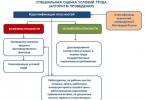Not a single law says about liability for the fact that a vehicle is dirty. But it is worth remembering that the traffic police inspector may charge you under other, related articles, so you should be on your guard.
Since the fine is directly for dirty car does not exist, we list the fines for related articles, which will be discussed below:
- Unreadable numbers – 500 rubles;
- Use of materials that make it difficult to identify the license plate – 5 thousand rubles;
- Pollution road surface– from 5 to 10 thousand rubles.
Most likely to be punished for dirty car under Article 12.2 of the Code of Administrative Offenses of the Russian Federation, part one:
Driving a vehicle with unreadable, non-standard or improperly installed state standard state registration plates, except for the cases provided for in Part 2 of this article - entails a warning or the imposition of an administrative fine in the amount of five hundred rubles.
But it’s easy to get around this penalty - you just need to wipe the license plates immediately before the trip; it’s not necessary to wash the entire car. However, if the weather suddenly fails, this solution will also be useless. But there is one caveat. According to the note to the article, a sign is considered unreadable not by sight, but by established standards. That is, the license plate is front and rear in daylight hours day should be visible from 20 meters, while it is not at all necessary to ensure complete readability of the number - just one digit is enough. At night, the rule applies only to the rear sign.
The standards are written rather conditionally, since no one can tell you exactly what constitutes light and what constitutes dark time of day, since this concept is purely subjective. So in in this case the punishment depends only on the integrity of the inspector and whether you are ready to have a calm dialogue with him.

Other types of fines
Driving a vehicle without state registration plates, as well as driving a vehicle without state registration plates installed in the places provided for this purpose, or driving a vehicle with state registration plates equipped with the use of materials that impede or complicate their identification - entails the imposition of an administrative fine in the amount of five thousand rubles or deprivation of the right to drive vehicles for a period of one to three months.
It is not said what kind of materials make identification difficult, so here, as in the case of determining the time of day, everything depends on many factors. Should adhered clay be considered such a material? What about the newspaper that stuck to the number during the wind? It's hard to say.
Another tool for collecting money from you is Article 12.33 of the Code of Administrative Offenses of the Russian Federation:
Damage to roads, railway crossings or other road structures or technical means organization of road traffic, which creates a threat to road safety, as well as deliberate creation of interference in traffic, including by polluting the road surface - entails the imposition of an administrative fine on citizens in the amount of five thousand to ten thousand rubles; on officials- twenty-five thousand rubles; on legal entities- three hundred thousand rubles.

In bad weather, keeping a vehicle clean seems extremely difficult. IN real life Not a single car owner in his right mind would check the cleanliness of the vehicle twenty times a trip and brush off every speck of dust from it, so getting a fine for a dirty car or not is just a matter of luck. However, this does not exempt car owners from timely cleaning.
If you have been fined directly for polluting your car, contact a qualified lawyer who will help you understand the current legislation.
Keeping your car clean is not easy. In most of Russia there is slush and dirt on the roads for at least six months a year. Maybe the traffic police inspector will not like the fact of a dirty car and it will come to a fine, let's find out.
What does the laws of the Russian Federation say?
There is no fine for a dirty vehicle in the Code of Administrative Offenses of the Russian Federation or in the traffic rules. But if the car is dirty in the area of license plates and headlights, then punishment is provided.
Clause 1 of Article 12.2 of the Code of Administrative Offenses of the Russian Federation states that driving with unreadable state registration plates is punishable.
The number is considered unreadable if at least one character is not visible on it from a distance of 20 meters. During daylight hours, this applies to both the rear and front license plates, and during dark times only to the rear license plate.
In 2019, a fine of 500 rubles is due.
If the car owner strongly disagrees with this, the traffic police inspector may threaten with deprivation of rights, citing clause 2 of Article 12.2, which provides for a fine of 5,000 rubles or deprivation of rights for 3 months.
Such punishment is threatened if the sign, in addition to everything else specified in this paragraph, is equipped with devices and materials that hide and interfere with its recognition.
We are talking about specially installed nets, flaps, etc. In principle, everything can be called “material,” including street debris that stuck to the car at the wrong time. It is up to the car owner to decide whether to go to court and seek the truth, or maybe even agree to a fine of 500 rubles (unless, of course, everything is limited to just a conversation).
Car headlights may also be affected.
After all, if they are completely covered with a layer of dirt, then the traffic police can equate them to turned off or not working headlights If the conversation and cleaning of the headlights did not end the matter, then you need to insist that the headlights are “malfunctioning”, because when driving with the lights off, the fine is 500 rubles (Article 12.20 of the Administrative Code). But the refusal lighting equipment, of course, is included in the list of malfunctions with which operation vehicle prohibited, but only at night. Driving during the day, if such a malfunction occurs on the road, is permitted to the nearest auto repair shop or parking lot, subject to necessary measures precautions (clause 2.3.1 of traffic rules)
Fine for road pollution
According to Article 12.33 of the Code of Administrative Offences, road pollution by a car is equated to intentional damage to the road surface. The fine is provided for citizens up to 10,000 rubles. And also 25,000 and 300,000 will be paid by officials and legal entities, respectively, which gives reason to believe that such penalties are provided primarily for heavy trucks and large construction equipment. But if indeed after off-roading with regular car If pieces of dirt fall off, it is theoretically possible to get fined.
Fines for dirty vehicles in bad weather
As stated earlier, there is no fine for a dirty car. As for license plates or headlights, bad weather is a good thing, as this is a reason to challenge the fine.
How can you challenge a fine?
To challenge a fine, you must attach to the protocol the actual weather conditions on the day the fine was issued. True, you need an official request to the weather forecast service; a printout, for example, of the Yandex.Weather website will not work.
A dirty car is always relatively unsafe. We are talking not only about limited visibility, but also about difficult identification of such a car, which affects this quite indirectly. But is there a fine for the dirty car itself? This will be discussed below.
What is the penalty for an unwashed car?
As of 2019, there is no penalty for an unclean car. Just as there is no obligation to wash the car with any frequency or keep it clean to a certain extent, there is no fine, no deprivation of rights, or even a warning for this.
But there are a number of subtleties when you can be punished for various individual dirty elements, as well as if the car leaves dirty traces behind it. And sanctions can seriously hit your pocket. Let's take a look at them below!
Is there a fine for dirty wheels?
No. A fine for dirty wheels would be more absurd than for an entire unwashed car.
As of July 8, 2019, neither the current version of the Administrative Code provides for any punishment for dirty wheels, nor does the Traffic Regulations contain a direct obligation to wash or clear wheels or tires of dirt or snow.
There is only an obligation to maintain them in good condition, in particular, from the non-obvious:
- the wheels must have all the required bolts or nuts,
- tires must be the same on one axle, in winter (during the winter calendar months) - only winter, in summer - only summer, and the use of both studded and non-studded tires on all 4 wheels is prohibited,
- residual depth tread for passenger cars– not less than 1.6 mm,
- There should be no cuts or bumps on the rubber, from which the cord shell is visible.
But such a resolution or protocol will be issued/drawn up illegally, because there is a punishment for turning off or not working – moreover, intentionally – external lighting devices. If they break down during daylight hours, then you can still drive to the nearest service station or parking lot (Section 2.3.1 of the Traffic Regulations). IN dark time You can’t do it for a day.

Dirty license plate
There is also no fine directly for an unwashed room. Formally, it is issued for being unreadable in our case - under Part 1 of Article 12.2 of the Code of Administrative Offenses in the amount of 500 rubles or a warning. It is considered unreadable if at least one of its letters or numbers is not visible from 20 meters (at night only for the rear number - the front number at night or in the evening may not be visible at all, because it is not illuminated).
Therefore, you should always monitor cleanliness. Eliminating this malfunction on the spot will not relieve you of the fine. Moreover, despite the sanction already applied, before starting to move after being stopped by a traffic police officer, you are required to wash it.
If a car pollutes the road
This is probably extreme case a dirty, dirty or mud-spattered car. If you are a “happy” member of a 4x4 or Offroad club, then when leaving the next ride on the asphalt, your car can pollute the road, and significantly. And there is a separate fine for this too.
For road pollution, a sanction is provided under Article 12.33 with an impressive fine of 5 to 10 thousand rubles.

Finally
And, of course, in addition to the direct fines listed above, a dirty car increases the likelihood of getting into others due to poor road visibility:
- if the headlights are dirty, you may not see markings, road signs, other cars may not see you,
- dirt can fly off onto other cars, damaging them (if you have a lot of it).
Well, the disadvantages of an unwashed car:
- spoils paintwork and fades unevenly
- What gets dirty is what touches the car: your hands, clothes, shoes,
- You are less noticeable on the road, especially in the evening or at night,
- and further whole line others from the presentability of the car and you as its driver to the attitude of other road users towards you.
Our roads are always dirty. And in the Rules there is a strict clause requiring that headlights be kept clean. Moreover, failure to comply with it can cost you money.
Good for owners of cars equipped with headlight washers. They don’t have such a question: just pull the steering column lever towards you - and the headlights are clean. Well, or clean to such an extent that the traffic police inspector has no complaints against you. However, most inexpensive cars There is no such option, and the headlights are often covered with a layer of dirt through which light cannot penetrate. So, the traffic rules (specifically, clause 3.3) equate dirty external lighting devices and reflectors to those not working in the prescribed mode. According to Article 12.5 of the current Code of Administrative Offenses of the Russian Federation, such a violation entails a warning or a fine of 500 rubles.
Moreover, according to Article 1.5 “Presumption of Innocence” of the same Code:
“The guilt of a person brought to administrative responsibility must be proven in the manner prescribed by the Code of Administrative Offenses of the Russian Federation, the specified person is not obliged to prove his innocence and irremovable doubts about the guilt of this person must be interpreted in his favor.”
Current Auto News
But it is quite difficult to prove convincingly, using technical means, that lighting devices are dirty. And, as practice shows, few people like writing protocols. It’s easier for traffic cops to find another violation (for example, a dirty license plate) or another “client,” and require the driver to fix the problem on the spot, that is, find a rag and properly wipe the headlights. In this case, there is no point in arguing. After all, we are talking primarily about your own safety. Especially if it happens in the dark.
A fine for a dirty car would certainly exist if the state provided for liability for a dirty car. Our honest people, seeing a traffic police car from afar, begin to shake and try not to create any disagreements with the inspectors, as a result of which the latter’s pockets are filled with banknotes, and the drivers themselves gain peace of mind, convincing themselves that this is how it should be.
But as they say, “Not knowing the law does not exempt you from responsibility and vice versa.” Therefore, let's look at some of the nuances in this matter. Many drivers who were stopped because their car was dirty began to frantically prove that the roads were dirty and there were long lines for car washes, they said they didn’t have time, but such motivation is not suitable for the inspector and they still have to pay a fine.
But there are also drivers who, based on traffic rules and administrative code found weighty arguments that paying for a dirty car was not appropriate and the actions of the traffic police officers were not legal, as a result of which the drivers received moral satisfaction from a mini-victory, and the inspectors tried to pretend that, go ahead, I’ll stop you again later.
This kind of “offense” has the main type of administrative penalty in the form of an oral warning. But if yours is dirty rear numbers and it is not possible to read them from a distance of 20 meters in the dark, then yes, if you please, pay. Although in this situation you can avoid a fine by bringing the license plates into an adequate form at the stop.
But the inspectors bother to include these standards in the daytime regime, so be vigilant. Of course, if you get into a traffic accident, then in the protocol about administrative offense The moment that you were driving a dirty car will be recorded. And in general, the topic of “divorce” in this vein is quite large. Traffic cops may pick on the fact that your headlights are dirty, but I assure you that in a court hearing he will never be able to prove this point because no one has yet equated the eyes of a traffic police officer with a certified luminous flux meter. The way out of all this is to constantly take care of your car. But in conditions of constant movement in big city, this possibility is not always provided.
Constantly pay 300-400 rubles for car washing, and for comprehensive cleaning up to 1000 rub. not always profitable, because due to, to put it mildly, not very clean roads, the hope of keeping the car clean for a long time “melts before our eyes.”
Gone are the days when there was a special every morning. equipment washed away all the swamp from the roads. Now the roads are best case scenario processed chemically. a composition that seems to corrode all the dirt, but at the same time also the body of the car. There is more dirt on the roads due to the fact that lawns have become a fashionable trend, which are always located at a level above the curb and after the seasonal rains begin to fall, the entire swamp begins to drain from them and at the same time is carried by cars along the roads.
Let's summarize. A fine for a dirty car is appropriate if it concerns cars that are on and off construction sites, taking with them masses of swamp on their bodies and wheels, because initially the article of the law was written mainly only for these cases. There is no way to determine how dirty your car is if it is only used within the city and does not go into swamps, because... criteria of “dirtyness” and causing “colossal” damage environment, simply doesn't exist.
In this situation, you need to rely only on your own adequacy and sober judgment of the traffic police officers and believe that such a gap in the legislation will someday disappear.



